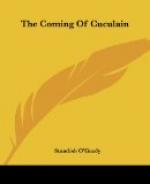“Winds and waters my instructors.”
These were O’Grady’s own earliest companions and no man can find better comrades than earth, water, air and sun. I imagine O’Grady’s own youth was not so very different from the youth of Red Hugh before his captivity; that he lived on the wild and rocky western coast, that he rowed in coracles, explored the caves, spoke much with hardy natural people, fishermen and workers on the land, primitive folk, simple in speech, but with that fundamental depth men have who are much in nature in companionship with the elements, the elder brothers of humanity: it must have been out of such a boyhood and such intimacies with natural and unsophisticated people that there came to him the understanding of the heroes of the Red Branch. How pallid, beside the ruddy chivalry who pass huge and fleet and bright through O’Grady’s pages, appear Tennyson’s bloodless Knights of the Round Table, fabricated in the study to be read in the drawing-room, as anaemic as Burne Jones’ lifeless men in armour. The heroes of ancient Irish legend reincarnated in the mind of a man who could breathe into them the fire of life, caught from sun and wind, their ancient deities, and send them, forth to the world to do greater deeds, to act through many men and speak through many voices. What sorcery was in the Irish mind that it has taken so many years to win but a little recognition for this splendid spirit; and that others who came after him, who diluted the pure fiery wine of romance he gave us with literary water, should be as well known or more widely read. For my own part I can only point back to him and say whatever is Irish in me he kindled to life, and I am humble when I read his epic tale, feeling how much greater a thing it is for the soul of a writer to have been the habitation of a demigod than to have had the subtlest intellections.




